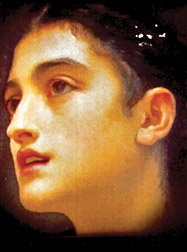Inside Shakespeare’s mind: The two faces of Portia
 Yet another split personality of Shakespeare's. The double acting of
Portia through ‘The Merchant of Venice’ is a wonderful study for a
psychologist in search of a literary slip-up and dare peep into a
character that appears simple and worldly but deep rooted in
complexities as that of Portia. One is of an heiress whose father
parades her as an ornament in a bid to find her a suitor that includes a
Prince who is rejected under his conditions and the others is that of a
young haughty and arrogant impersonating lawyer in a bid to save her
lover. Yet another split personality of Shakespeare's. The double acting of
Portia through ‘The Merchant of Venice’ is a wonderful study for a
psychologist in search of a literary slip-up and dare peep into a
character that appears simple and worldly but deep rooted in
complexities as that of Portia. One is of an heiress whose father
parades her as an ornament in a bid to find her a suitor that includes a
Prince who is rejected under his conditions and the others is that of a
young haughty and arrogant impersonating lawyer in a bid to save her
lover.
Now, let us take a look at the full title of a Quarto text that in
1660 gives a useful simplified summary (mind the English) ‘The most
excellent Historic of the Merchant of Venice with the extreme cruelty of
Shylock the Jew towards the said Merchant, in cutting a just pound of
his flesh; and obtaining of Portia by the choice of three chests'.
Shakespeare so often was inspired by many sources such as from
Italian and English background for a pound-of-flesh and the three
caskets which comes into prominence in the play as he amalgamate and
transmute. Giving some more hints for his source could have been
Marlowe's The Jew of Malta. This so impressed the Royal Shakespeare
Centre that it staged the play under this title and followed it with
Shakespeare Merchant of Venice in 1965. In all instances Portia's
character was diversified differently according to the fancy of its
directors.
Synopsis
Written in 1596-7 and sited in Venice and Belmont, the play revolves
around Portia, an heiress from Belmont. Bassanio who needs a large sum
of money to wed her, is helpless and requests his friend Antonio to lend
him some. But Antonio who do not have the said sum of 3,000 ducats
because although he is wealthy, his ships still are at sea. Therefore,
he goes to Jewish moneylender called Shylock and obtain same with the
condition that if the money is not returned in three month's time,
Antonio would have to let the Jew have a pound of flesh to which he
agrees foolishly.
 |
 |
|
The two faces of Portia – As the
winsome young lawyer, Balthasar who beat Shylock at his own
game and as the most eligible heiress of Belmont |
As this incident is taking place, back at Belmont, Portia welcomes
the Prince of Morocco who has come to make his choice under the will of
Portia's father that all intended suitors must choose one from three
caskets of gold, silver and lead. If he does not get the answer right,
he can never marry in life. Prince of Morocco fails with the golden
casket.
(At Belmont in Portia's house)
Enter Portia:-
Portia - Go draw aside the curtains and discover the several caskets
to this noble prince. Now, make your choice.
Prince - The first of gold, who this inscription bears; ‘Who chooseth
me shall gain as much as he deserves. The second silver, which this
promise carries ‘Who chooseth me shall get what men desire'.
And this third dull lead with warning of as all of blunt ‘Who
chooseth me must give all and hazard all the hath ‘How shall I know if I
do choose the right?
Portia – The one of them contain my picture, Prince; If you choose
that, I am yours.
Prince – Some god direct my judgment. Let me see. I will survey the
inscription back again. What says this leaden casket? Must give for
what. For lead, hazard. This casket threatens; men that hazard all. Do
it in hope of fair advantages. A golden mind stoops not to shows of
dross......................... (still later)
Portia – Then, take it Prince and if my form lies there, then I am
yours. (He opens the golden casket)
Prince – O hell what have we here? A carrion death within whose empty
eye. There is written a scroll. I will read the writing..........'All
that glisters is not gols...... ACT. II, Sce. VII
As Prince Morocco fails, so does the Prince of Arragon who choose the
silver casket. Bassanio and his friend, Gratieno are on their way to
Belmont while Jessica, Shylock's daughter dressed as a boy, has eloped
with Lorenzo, taking her father's rings and ducats.
Shylock is raged by the loss of his rings and money while Bassanio
who has chosen the correct casket made with lead, prepares to wed
Portia. Narissa who is her gentleman also plans to marry Gratieno. Next,
Salerio who is also a friend of Bassanio, brings the news that Shylock
is demanding his due which is the pound of flesh from Antonio whose
ships have miscarried and he is without money.
There must be a trial, Portia decides
She impersonates as a young lawyer calling herself, as Balthasar and
her clement Nerissa. Accepting the fact she tells court that Shylock is
right and the pound of flesh from Antonio is due for the Jew. However,
admitting that the bond is flawless, Portia begs Shylock to have mercy
on her client with offers of money which he rejects. The pound of flesh
is all what he wants. He is about to cut off a pound of flesh when
Portia stops him to explain. ‘Tarry a little’ she says ‘there is
something I wish to say. ‘You are not entitled to one drop of blood.
Surprised and realizing his situation, he is prepared to take back his
3000 ducats. Portia will not and instead says he will be charged as an
alien who has conspired against a Venetian and will have to forfeit his
own life. After much deliberation, the Jew is pardoned on pledge that he
will become a Christian. He will also bequeath his wealth to Lorenzo and
Jessica at his death. The Jew leaves the court as an utterly
disillusioned man.
However, often it is heard, Portia's ‘Tarry a little, there is
something else’ at the climax of the trial, can remain startlingly
dramatic. Shylock is the governing figure in spite of the title of the
play and Antonio is secondary to both his enemy and his saviour.
The play moves fast with catchy dialogue that never seem to pause
which makes it a firm favourite for the stage.
I saw a version of this play in a very modern set-up with all male
characters in denims and the females in minis with stilleto shoes that
clicked across the stage.
But, ‘funny’ I thought, especially the Jew in blue denims and white
open collar.
In performance
There were no recorded performance on Shakespeare's text between 1605
to 1741. However, a very silly production that turned out to be a flop
and directed by George Granville was staged, a little later. A Drury
Lane version in which John Phillip Kemble played Shylock for many years
from 1786 with Sarah Siddons as Portia, saw the same cast continuing
only with one change and that was Kemble being replaced by George
Fredrick Cooke who played Shylock as a depraved demon.
The twentieth century saw many versions of The Merchant of Venice
with hysterical extravagantly theatrical productions repulsively
realistic. The role of Shylock was gaining star-dust as one thespian
from another such as Michael Redgrave to Laurence Olivier gave new life
to the role. The others to follow were innumerable and there was no
stopping to this comedy gaining momentum with each revival. Portia was
taken over by such reputed actresses such as Ethel Barrymore, Ketherine
Hepburn etc. There was also an operatic version of this play in 1922
directed by Sir Frank Benson, highlighting the differences between the
two Portias.
Credits
Shylock – Outraged father, avenging creditor and usurer which means
that the name is a transliteration of the Hebrew word for ‘cormorant’
and the precise emphases must vary with each actor doing the role; along
with the changing responses to Jewry across the centuries. Second
longest part in the play with 359 lines.
Antonio – Not just a distillation of melancholy and unselfish,
serious, patient merchant whose personality must be projected and not
appear as a cipher before the obliteration Shylock.
Bassanio – Lover to Portia Venetian scholar and a soldier. Though
critics sit hard on him, he is a deep thinking character that can match
up Portia.
Grationao – Often overplayed friend to Antonio and Bassanio. Noble
and gentle.
Portia – The central character of the play though Shylock dominates.
She is from Belmont, witty, adventurous and at heart, entertains
fantasy. Impersonates as a young lawyer to save Antonio from Shylock.
Nerissa – Portia's gentlewoman also from Belmont.
Duke of Venice – Purely a functional character; can be a distraction
in certain scenes. Why Shakespeare introduced him, no one knows.
Prince of Morocco – Who dare to woo Portia but return disillusioned.
Prince of Arragon – The arrogany Spanish suitor who suffers the same
fate as of Prince of Morocco.
Balthazar – His name is shared with Portia's servant as well as with
her young ‘lawyer’ at the trial of Antonio.
Jessica – Daughter to Shylock.
Lorenzo – Lover to Jessica and a brag who lives on his praise of
music.
|





